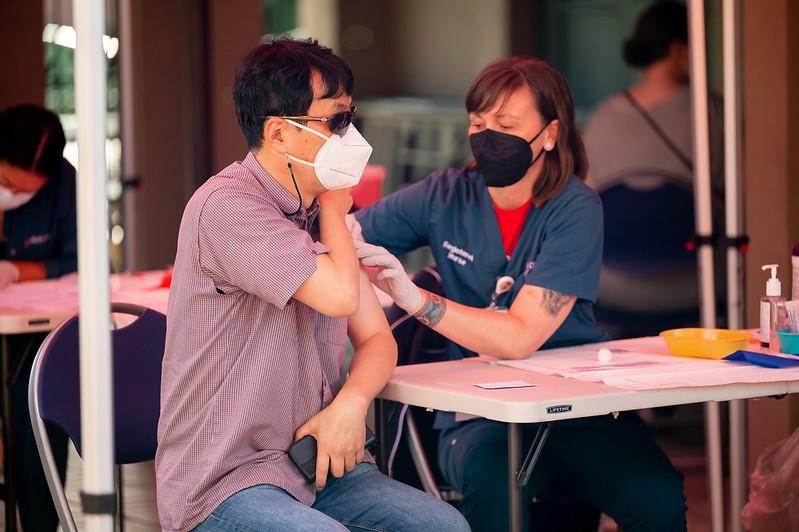COVID-19 vaccine acceptance climbed from 75% in 2021 to 79% in 2022 in 23 countries representing nearly 60% of the global population, finds a survey published yesterday in Nature Medicine.
A team led by City University of New York (CUNY) researchers conducted its third annual study of COVID-19 vaccine reluctance among 23,000 people in 23 countries (1,000 per country) in Africa, Asia, the Americas, and Europe from Jun 29 to Jul 10, 2022. Half of participants (50.3%) were women, 22.2% held a university degree, 45.6% reported annual incomes above their nation's median, and 10.8% were healthcare workers.
US acceptance rose 20%
Global willingness to receive at least one COVID-19 vaccine dose was 79.1%, up from 75.2% in June 2021, an increase of 5.2%. In the United States, vaccine acceptance climbed 20.4%, to 80.2%, from 2021 to 2022. As of October 2022, 68% of Americans had completed the primary vaccine series, and 80% were partially vaccinated, according to the New York Times.
In eight countries, however, vaccine hesitancy increased (range, 1.0% in the United Kingdom to 21.1% in South Africa). And nearly 1 in 8 of all respondents (12.1%), particularly those aged 18 to 29 years, said they were hesitant to receive a booster dose (range, 1.1% in China to 28.9% in Russia). In the United States, 87.0% of respondents said they accepted the booster as of October 2022.
Vaccine reluctance was significantly associated with men in Nigeria and Peru (adjusted odds ratio [aOR], 4.42 to 5.24), women in China, Poland, and Russia (aOR, 0.06 to 0.67), and lack of a university degree in France, Poland, South Africa, Sweden, and the United States (aOR, 0.15 to 0.60). Belief in the vaccine's safety and efficacy and trust in science were strongly correlated with acceptance.
Booster hesitancy was significantly linked to younger age in France, Germany, Poland, South Korea, Spain, and Sweden (aOR, 0.96 to 0.98), older age in Ecuador (aOR, 1.09), men in Ecuador (aOR, 5.69), women in France and the United States (aOR, 0.53 to 0.57), lack of a university degree in Italy and South Africa (aOR, 0.28 to 0.52), and with earning less than the nation's median income in Canada, Germany, Turkey, and the United Kingdom (aOR, 1.81 to 11.14).
Belief in the vaccine's safety and efficacy and trust in science were strongly correlated with acceptance.
While overall support for vaccinating children rose slightly, from 67.6% in 2021 to 69.5% in 2022, it fell among parents in eight countries (range, -2.4% in Poland to -56.3% in Brazil) and among parents who themselves were hesitant about vaccination. Nearly 2 in 5 respondents (38.6%) said they were paying less attention to new COVID-19 information than in 2021, and support for vaccine mandates had also waned.
Nearly 40% of respondents said that they or a family member tested positive for COVID-19 in the past year (range, 0.8% in Nigeria to 60.9% in Singapore). Of them, 24% said they took medications to relieve their symptoms (range, 6.2% in Germany to 68.9% in Ghana). Medications taken included monoclonal antibodies (27.2%), the antiparasitic drug ivermectin (unproven and not recommended for COVID-19; 27.0%), and the antivirals Paxlovid (25.8%) and molnupiravir (20%).
Two thirds of respondents (66.6%) said they still approved of COVID-19 vaccination, and 53.2% believed that vaccines protect against long COVID, but 25.2% said they are now less likely to seek vaccination because they perceived illness severity to have lessened over the years.
Targeted interventions needed
The study authors noted that the drivers of vaccine hesitancy and refusal vary by time and region and include lower educational attainment, mistrust of science and government, and misinformation.
"Around two-thirds (66.4%) of the world's population had received at least one dose of a COVID-19 vaccine as of 30 June 2022, but only 17.4% of people in low-income countries had received a first dose, underscoring unequal access, availability and delivery," they wrote.
The ongoing flood of COVID-19 information, truthful or not, continues to slow vaccine literacy, they said. The misconceptions that infections with new variants are always less severe or that the availability of newer treatments has offset the need for vaccination have further complicated efforts to increase uptake.
Around two-thirds (66.4%) of the world's population had received at least one dose of a COVID-19 vaccine as of 30 June 2022, but only 17.4% of people in low-income countries had received a first dose, underscoring unequal access, availability and delivery.
"Vaccination remains a cornerstone of the COVID-19 pandemic response, but broad public support remains elusive," the researchers wrote. "These data can be used by health system decisionmakers, practitioners, advocates, and researchers to address COVID-19 vaccine hesitancy more effectively."
In particular, public health strategies to increase booster uptake, which are needed amid waning vaccine efficacy, should be more sophisticated and targeted to each setting and population, lead author Jeffrey Lazarus, PhD, MIH, said in a CUNY press release. "Strategies to enhance vaccine acceptance should include messages that emphasize compassion over fear and use trusted messengers, particularly healthcare workers," he said.
Senior author Ayman El-Mohandes, MBBCh, MD, MPH, of CUNY, called for continued surveys on vaccine acceptance and hesitancy. "We must remain vigilant in tracking this data, containing COVID-19 variants and addressing hesitancy, which may challenge future routine COVID-19 immunization programs," he said in the release.




















